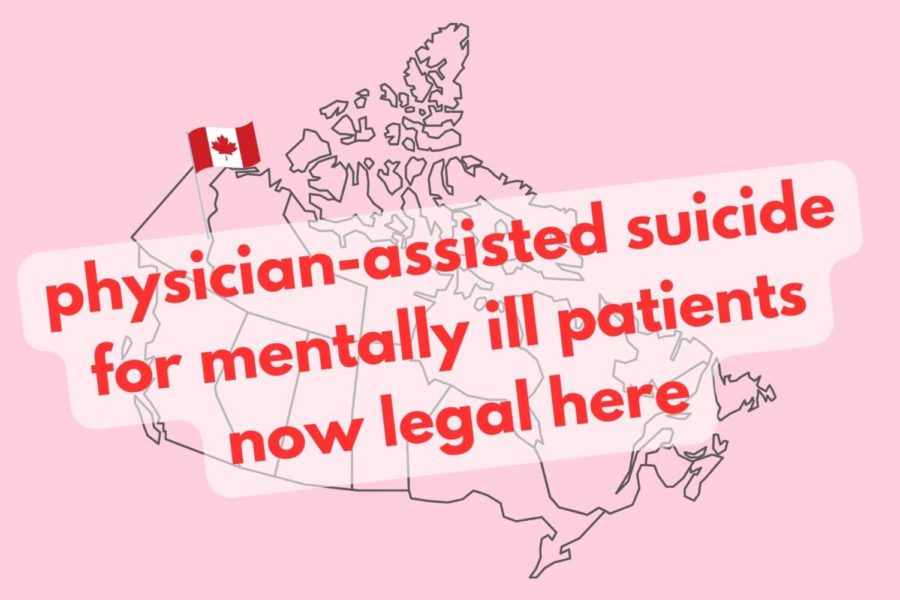Medicine Today: Physician-assisted suicide laws extend to mentally ill patients in Canada
May 26, 2023
As someone who grew up having a grandfather who is a retired physician of 40 years in Toronto, I have always been very interested in medicine. Since I’m Canadian, I pay attention to the differences between what is allowed in Canada versus the United States in terms of healthcare. One night, I was on the phone with my grandfather, and he told me about an extension of physician-assisted suicide laws in Canada — and it sparked my attention.
Traditionally, physician-assisted suicide (PAS) is an option available to patients who are terminally ill— someone likely to die within the next six months due to illness. Cornell University defines physician-assisted suicide as “an end of life measure for a person suffering a painful, terminal illness.” Other words for it are “mercy killing” or the “right to die.” It involves a medical professional administering large doses of pain-killing medication to the patient with the intention of inducing death. I knew someone who had advanced bladder cancer and only a few months to live, and she chose PAS due to her age and how much her condition had worsened. However, the extension of PAS to include mentally ill patients is growing and now even reaching places like Canada.
As early as 2021, the Psychiatric Times reported that several European countries, such as Belgium, the Netherlands, Luxembourg and Switzerland allow suicidal patients to die through “assisted suicide,” without a terminal condition as a necessary criterion — and this was legalized in 2002.
The question that must be asked is whether or not this is considered suicide, and if it is, how it could possibly be justified. A study done by Rosalie Pronk, Dick L. Willems and Suzanne van de Vathorst, published in 2020, explored how it is possible to distinguish between suicidality and a rational request for physician-assisted death. The study says that evaluating if the wish is consistent over time and if the mental illness is considered treatable are some ways to discern the difference. It argues that in cases when the patient’s suffering is unbearable and irremediable, “physician-assisted death in these cases may remain the only option left to relieve the suffering.”
Canada is the latest nation to legalize voluntary death for psychiatric conditions, according to the Psychiatric Times. This new initiative in Canada followed the Benelux model, also known as “Bill C-7” — it “removed the prior exclusion of those who have non-terminal chronic illnesses and permitted euthanasia for those whose psychological or physical suffering is deemed intolerable and untreatable.” Dr. Stan Kutcher, MD, psychiatrist, and Canadian Senator, agreed with statements in support of the Benelux model from the Canadian Psychiatric Association (CPA) and amended the law to allow MAID (Medical Assistance in Dying) to include mental illness, becoming legal in early 2021.
This subject is very controversial, since suicide has always been stigmatized due to the obvious issue of what it means to end your own life. The fields of psychology and psychiatry have worked very hard to understand suicide, try their best to prevent it, and promote better mental health — and now these fields could be drastically changed. The American Psychiatric Association responded in 2016, stating that “a psychiatrist should not prescribe or administer any intervention to a non-terminally ill person for the purpose of causing death.”
A question I was curious about was, how could these laws affect someone who is thinking of going into medicine, like me? Will these laws affect interpretations of parts of the Hippocratic Oath, such as the vow to “do no harm?” Could these laws undermine psychiatric advancements, or are they a part of medical progress?
There are no simple answers to these questions. The implementation of these laws provoke different responses from people about the morals, ethics, and implications.
Dr. Gily Chechel, psychiatrist, says, “There is an easy answer — how I would act personally — and a more thoughtful and complicated answer… the easy answer is that personally, I would not feel comfortable assisting in a patient’s death. Partly because it goes against everything I was trained to do, and partly because I strongly believe that most of the time people eventually change their minds about wanting to die.”
Chechel goes on to say that the general problem is “much more complicated” and involves many factors, such as the principles of medical ethics that allow patients to make their own medical decisions, the patient’s competence, considerations of alternatives, and the question of, “what if you don’t help them die… will their suffering ultimately be worse than death both for them and others?”
I have learned that the very fact that the patient has a mental illness itself does not make the patient unable to make this decision. Psychiatric diagnoses do not make people automatically incompetent, as confirmed by Dr. Chechel. If the patient is clear about what they want, they have tried and failed multiple times to treat themselves, they believe they are harming others by being alive, they feel that nothing will make them better, and they understand what they are deciding to do, then that is considered rational.
However, psychiatrists recognize that mental illness is not comparable to terminal illness — and usually, psychiatric intervention does help and people will get better. This is why a very thorough evaluation of individual cases should be done.
“Each of these factors is insanely complicated in its own right,” Chechel says. “So, when I look at the big picture, and not my personal feelings, I recognize that each case is different and unique and should be judged on its own merits with careful consideration of all the factors.”
These laws are typically contained to very subjective cases. However, that doesn’t change the fact that this minority is present.
“I have in fact met one or two patients over my career that I could argue would benefit by such laws. They live in locked, state-run psychiatric hospitals and their lives are pretty terrible,” Chechel says. “I would never help in this regard myself, but I would not blame a doctor who would. Thankfully, such cases are extremely rare.”
In addition to only catering to that 1% of people, these laws are very regulated, do not apply to anyone suspected to be irrational, impulsive, or incompetent, and are always subject to the interpretation of individual situations — so there is no black-and-white response to this.
However, being Canadian myself, it shocks me that Canada is part of such a new and controversial change in these laws. In my opinion, the idea of medical doctors are the ones in our society who try their hardest to keep people alive, not the ones who help people die. It is best for me to keep an open mind about these topics and look at it from all points of view, though, as someone who is interested in pursuing a career in medicine — even though my personal belief is that allowing suicidal people to die is crazy. Most of the time, the best decision to make is not the one that ends your life. The problem is that those few cases where the person really would be better off dead, since they have absolutely no quality of life, manage to convince me otherwise.
Even so, the point at which a patient considers PAS should be a last resort. The patient should no longer have any quality of life and death should truly be the best option. It is difficult to put ourselves in these patients’ positions and to think about how bad someone’s mental state and life would have to be for a doctor to be compelled to help put an end to it.
So, the question remains: should suicide really be medically and legally facilitated?































